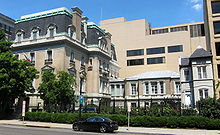- Konstantin Umansky
-
 Konstantin Aleksandrovich Umansky.
Konstantin Aleksandrovich Umansky.
Konstantin Aleksandrovich Umansky (Ukrainian and Russian: Константин Александрович Уманский; 14 May 1902 - 25 January 1945)[1][2], was a Soviet diplomat, editor, journalist and artist.[3]
Biography
Umansky, who was Jewish,[4][5] was born in Mykolaiv; he began studies at Moscow University in 1918, and joined the Russian Communist Party (Bolsheviks) in 1919.[1]
From August to October 1922 Umansky worked in the People's Commissariat of Foreign Affairs.[1] His ability to learn new languages, of which he was said to be able to learn a new language in a month, and spoke Russian, French, Italian, German and English, gained him a position with the Telegraph Agency of the Soviet Union as a correspondent, which took him abroad to places including Rome, Paris and Geneva.[1][3][6][7] Working for TASS from 1922–1931, there were rumours that his career in journalism was mixed with secret police activities, but Umansky refused to answer questions on this subject, stating only, "It is beneath my dignity to answer such a question."[7]
From 1931 to 1936 Umansky worked in the Press and Information Department of the Soviet People's Commissariat of Foreign Affairs, first as its Deputy Head, and then as its Head.[1]
In 1936, Umansky was posted to Washington, D.C. where he was an Adviser at the Soviet Embassy. When the diplomatic mission of Alexander Troyanovsky was completed, Umansky acted as chargé d'affaires of the embassy, when on 11 May 1939, Umansky was appointed by Joseph Stalin as Ambassador of the Soviet Union to the United States and he presented his Letters of Credence to U.S. President Franklin D. Roosevelt on 6 June 1939,[1] becoming, at the time, the youngest Ambassador in Washington, D.C..[7]
Upon his return to Moscow, he worked at the People's Commissariat of Foreign Affairs. Promoted to the diplomatic rank of Ambassador Extraordinary and Plenipotentiary on 14 June 1943, Umansky was appointed by Stalin on 17 June 1943 as Ambassador of the Soviet Union to Mexico. Umansky presented his credentials to President of Mexico, Manuel Ávila Camacho on 22 June 1943.[1] At the ceremony of the presentation of credentials, Umansky presented his speech in English, for which he apologised to Camacho, promising that he would learn Spanish; which he became fluent in just three months later.[8] The reasons for the posting of a diplomat the calibre of Umansky to Mexico was unclear, and it had been suggested on numerous occasions that Umansky was posted to Mexico as part of undercover activities, however, TIME noted that Umansky's behaviour as a diplomat was always above reproach.[7] However, according to Cordell Hull:
“ [He was] insulting in his manner and speech, and had an infallible faculty for anagonizing. Overbearing, he made demands for concessions as if they were his natural right....In my opinion, he did much to harm Russian-American relations.[9] ” It has also been suggested that Umansky was posted to Mexico as part of a campaign to improve perceptions of the Soviet Union, which had taken a battering following the murder of Leon Trotsky in Mexico in 1940.[8] According to Germán List Arzubide, Umansky was the most popular diplomat in Mexico.[8] Due to the efforts of Umansky, by the end of 1944 Soviet–Mexico relations had regained a friendly character, and both countries intended to expanded their relations in the post-war period.[8]
On 8 July 1944, Umansky was appointed as Ambassador of the Soviet Union to Costa Rica, in concurrence with his posting in Mexico.[1] On 25 January 1945, Umansky was to have travelled to San José in Costa Rica to present his Letters of Credence to Costa Rican President Teodoro Picado Michalski, however the Mexican Air Force plane which he was aboard crashed on take-off in Mexico City, killing the Ambassador, his wife (Raisa Umanskaya) and three embassy officials.[1][7][10] The cause of the crash is still unknown to this day, and following the crash tens of thousands of Mexicans paid their respects to Umansky at the Soviet Embassy, led by President Camacho.[8] In an obituary, Mexican newspaper Excélsior wrote "With Umansky, a new era in local diplomatic activity has begun. Many foreign diplomats have passed through Mexico, but those whom were here at that time, should recognise that they lived in the diplomatic world of the Umansky era".[8]
References
- ^ a b c d e f g h i (Russian) "Уманский Константин Александрович". Справочник по истории Коммунистической партии и Советского Союза 1898 - 1991. http://www.knowbysight.info/UUU/03666.asp. Retrieved 2009-08-01.
- ^ (Russian) "Уманский Константин Александрович (1902-1945)". Новодевичье кладбище. http://novodevichye.narod.ru/umanskiy2.html. Retrieved 2009-08-01.
- ^ a b Everett, Dirksen (20 May 1939). "The Congressional Front". Dirksen Congressional Center. http://www.dirksencenter.org/guides_emd/Dirksen_Newsletters/Congressional%20Front%2005.20.39.pdf. Retrieved 2009-08-01.
- ^ Gilboa, Jehoshua A. (1971). The black years of Soviet Jewry, 1939-1953. Little, Brown. pp. 246. http://books.google.com.au/books?id=er5tAAAAMAAJ. Retrieved 2009-08-01.
- ^ Low, Alfred D. (1990). Soviet Jewry and Soviet policy. East European Monographs. pp. 4. ISBN 088033178X. http://books.google.com.au/books?id=8nMyAAAAIAAJ. Retrieved 2009-08-01.
- ^ Shaw, Bernard; Gibbs, Anthony Matthews (1990). Shaw: interviews and recollections. University of Iowa Press. pp. 324. ISBN 0877452326. http://books.google.com.au/books?id=fbgnAAAAMAAJ. Retrieved 2009-08-01.
- ^ a b c d e "MEXICO: Ambassador's End". Mexico City: TIME. 5 February 1945. http://www.time.com/time/magazine/article/0,9171,797056,00.html. Retrieved 2009-08-01.
- ^ a b c d e f (Russian) Sizonenko, Alexander (7 December 2000). "Дипломат суровой поры". Nezavisimaya Gazeta. http://www.ng.ru/style/2000-12-07/16_diplomat.html. Retrieved 2009-08-01.
- ^ As quoted in Brinkley, David (1988). Washington Goes to War. Ballantine Books. p. 37. ISBN 034540730X.
- ^ "Russian Ambassador killed in air crash". Mexico City: The Canberra Times. 27 January 1945. http://ndpbeta.nla.gov.au/ndp/del/article/2614084. Retrieved 2009-08-01.
Categories:- 1902 births
- 1945 deaths
- People from Mykolaiv
- Soviet diplomats
- Ambassadors of the Soviet Union to the United States
- Ambassadors of the Soviet Union to Mexico
- Ambassadors of the Soviet Union to Costa Rica
- Soviet Jews
- Soviet journalists
- Victims of aviation accidents or incidents in Mexico
- Communist Party of the Soviet Union members
- Soviet artists
Wikimedia Foundation. 2010.

